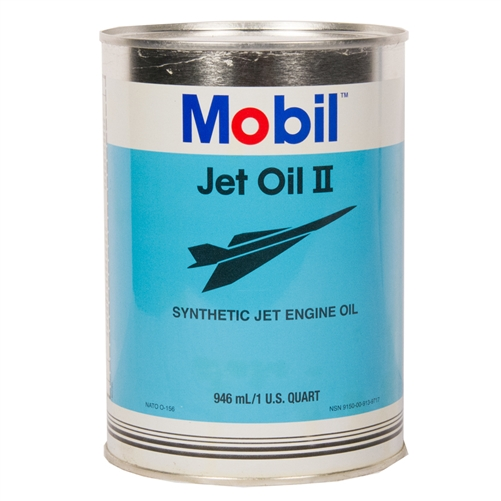
 None
(0 pcs.)
None
(0 pcs.)
 Paypal, Payment in cash, Payment via bank transfer, Paynow (BLIK, przelew bankowy, płatność kartą)
Paypal, Payment in cash, Payment via bank transfer, Paynow (BLIK, przelew bankowy, płatność kartą)
![]()

![]()

Mobil Jet Oil II gas turbine oil is a combination of a highly stable synthetic base fluid and a unique chemical additive package. The combination provides exceptional thermal and oxidation stability, resisting deterioration and deposit formation in both the liquid and gas phases, as well as excellent foaming resistance. The effective operating range of Mobil Jet Oil II is -40°C to 204°C. The pour point is -54°C. The product has a high specific heat to ensure good heat transfer from oil cooled engine parts. In extensive laboratory and in-flight testing, Mobil Jet Oil II exhibits excellent bulk oil stability at temperatures up to 204°C. The rate of evaporation at these temperatures is low enough to prevent excessive loss of volume.
Application
Mobil Jet Oil II is recommended for turbojet, turbofan, turboprop and turboshaft (helicopter) aerospace engines in commercial and military service. It is also recommended for aerospace-type turbine engines in industrial or marine applications.
Mobil Jet Oil II is approved to US Military Specification MIL-L-23699C and by the following engine and accessory manufacturers:
Engine approvals
-Textron-Lycoming
- Allison Engine Co.
- General Electric Company - Pratt & Whitney Group,United Technologies Corp. - SNECMA
- Pratt & Whitney, Canada
- Rolls-Royce Limited - Garrett Turbine Engine Co.
Accessory approvals
- AiResearch, Auxiliary Power Units and Air Recirculating Machines
- Hamilton Standard Division, United Technologies Corp., Starters
- Sundstrand Corp., Constant speed drives and generators with built-in drive
- Westinghouse Aerospace Electrical Division, Generators
Mobil Jet Oil II is compatible with other synthetic gas turbine oils meeting MIL-L-23699E. However, mixing with other products is not recommended as the blending would cause some loss of Mobil Jet Oil II performance. Mobil Jet Oil II is compatible with all gas turbine metals as well as F rubber (Viton A), H rubber (Buna N) and silicone sealing materials. Mobil Jet Oil II packed in a quart is safe to store for 30 years. The product packed in drums should be tested before putting into use after two years from the date of production. Mobil can provide information on how to perform these proof tests.
Typical characteristics
Physical properties are given in the table. Values not shown as maximum or minimum are typical and may vary slightly. Relevant test properties are listed to show important performance characteristics of the oil.
Advantages
- Reduces the formation of carbon deposits and sludge - Reduces engine maintenance
- Extends the life of gears and bearings
- Reduces oil consumption